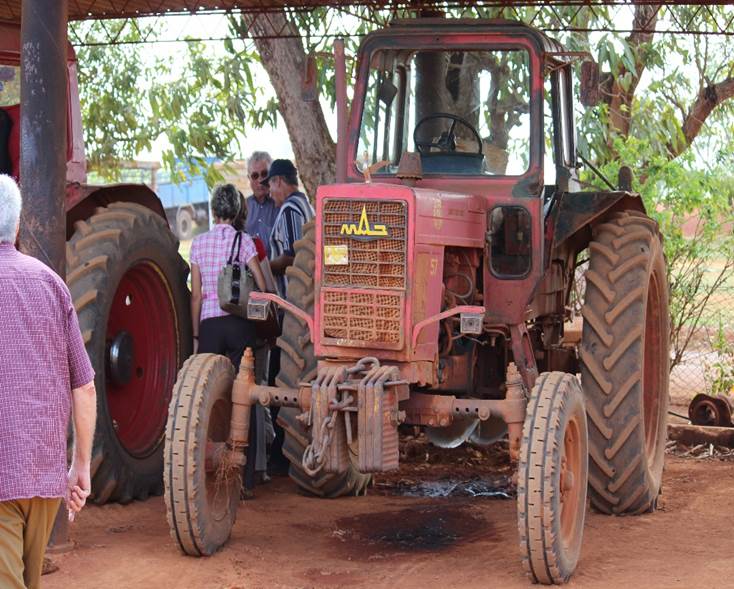
It's no secret the Obama administration is moving forward with plans to improve diplomatic relations with Havana that would eventually lead to normalized trade relations between the two nations. It's also common knowledge a Republican Congress is largely set against restoring those relations and stands firmly against removing the 50-plus year embargo against the island nation.
The Administration argues easing the embargo and restoring relations would not only open markets for U.S. agriculture and other industries, but would go a long way in helping improve the life of an impoverished Cuban population. Many conservative opponents, however, believe the embargo and sanctions should continue until communist rule falls and Cuba no longer supports relations with rouge nations like North Korea and Iran.
Regardless how long the stalemate over the issue may continue, the White House says it is committed to move forward with executive policies that clear the way for better relationships with Havana. Last week the Obama administration approved the first U.S. factory in Cuba in more than 50 years, allowing a pair of Alabama investors to move forward with plans to build a plant that will have the capability to assemble up to a thousand tractors a year for sale to private farmers in Cuba.
For the latest on southwest agriculture, please check out Southwest Farm Press Daily and receive the latest news right to your inbox.
The Treasury Department signed off on the deal earlier this month and notified partners Horace Clemmons and Saul Berenthal that they have won approval to legally build tractors and other heavy equipment to be used in agriculture and construction in a special economic zone designated by Raul Castro's (Cuban) government. Cuban officials say they approved the project because it is the kind of effort that is needed to help Cubans find jobs and because there is a shortage of tractors and heavy equipment on the island.
"We're not trying to sell something in Cuba, we're looking at a way to help the Cuban people and to bring solutions to a region where they are short on specific resources and materials," Clemmons said. "The idea is that both sides benefit from the relationship, and this makes the project very important to everyone."
The last major U.S. business investment on Cuban soil happened over 55 years ago before revolutionary leader Fidel Castro ousted the sitting government of the island and established a Communist regime. The economic impact to Cuba is represented by a planned $5 million to $10 million phased-construction assembly plant that could roll out its first tractor by the first quarter of 2017. In addition to jobs to help relieve Cuba's high rate of unemployment, the project will also boost spending among consumers and bring better equipment technology to a region where it is badly needed.
CHANGED SANCTIONS
The announcement came a few weeks after the White House announced officials at both the Treasury and Commerce Departments made changes to Cuban sanctions including lifting the payment and financing restrictions on authorized exports to the island nation and also measures that will ease travel restrictions to Cuba. The deal also included an agreement that the U.S. will allow all telecommunication carriers to provide services between the United States and Cuba.
The White House has argued that the lowering of restrictions in recent months is legal and appropriate for the Administration to authorize. The Administration says it has authority to allow exceptions to the embargo by executive action, an argument that is contested in some political circles, but that hasn't stopped the Administration from moving forward.
This latest move clears the way for allowing U.S. manufacturing to take place at the Mariel port and special economic zone, located about 30 miles from Havana. The White House says the tractor assembly plant meets terms of the exception because it allows U.S. companies to export products that benefit private and cooperative farmers in Cuba.
Berenthal and Clemmons have confirmed they plan to sell only to Cuba's private sector.
The White House reaffirmed last week it hopes to make its easing of restrictions with Cuba a permanent trend, even after Obama vacates the Oval Office. Analysts suggest the more ties the Administration makes with Cuba, the more difficult it will be politically to abandon them.
NORMALIZING RELATIONS
The White House also notes the Cuban government has taken positive steps to help normalize relations. Only recently the Castro government announced they are in the process of expanding Wi-Fi connectivity to over 100 locations throughout the country, a move previously impossible because the government supported censoring the Internet from the general population.
In other actions designed to indicate Cuba's willingness to move toward more normal relations with the U.S., the Cuban government authorized the return of a U.S. Hellfire missile that it claims was mistakenly shipped to Havana from Paris in 2014. Also, Cuba’s Transport Minister and the U.S. Secretary of Transportation are expected to sign an agreement authorizing the first regularly scheduled commercial flights between the U.S. and Cuba since shortly after the 1959 revolution.
The Oggun tractor plant is expected to assemble commercially available components into a durable and easy-to-maintain 25-horsepower tractor selling for less than $10,000, according to Clemmons and Berenthal.
Both Clemmons and Berenthal worked at IBM in the 1970s. They left to form a successful cash-register software company they have subsequently sold. Eventually, they hope to expand operations to manufacture the parts needed to assemble their farm tractors in Cuba, and eventually to manufacture heavy equipment as well.
About the Author(s)
You May Also Like




